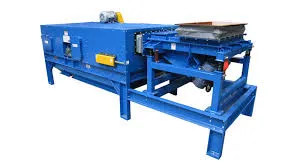

Nov . 08, 2024 02:00 Back to list
The Versatility and Efficiency of Crusher Hammer Mills
In the world of size reduction machinery, crusher hammer mills stand out as one of the most versatile and efficient tools available. These machines play a crucial role in various industries, including agriculture, mining, and recycling, where they break down materials into smaller sizes to facilitate further processing or enhance usability. Understanding the operational principles, benefits, and applications of hammer mills can provide valuable insights into their significance in modern manufacturing and production processes.
How Hammer Mills Operate
At its core, a hammer mill consists of a rotating drum fitted with heavy-duty hammers, which are rigidly mounted on a central shaft. As the drum rotates, the hammers swing outward due to centrifugal force and impact the material introduced into the mill. This mechanical action breaks the materials into smaller particles through direct impact, shear, and compression. A screen at the bottom of the mill allows particles to exit once they have reached the desired size, while larger chunks are continuously processed until they are sufficiently reduced.
Types of Materials Processed
One of the key advantages of hammer mills is their ability to process a wide range of materials. They are commonly used to crush and grind grains, wood chips, textiles, and various aggregates. In the agricultural sector, for example, hammer mills are employed to grind corn, barley, and other cereals into fine particles for animal feed. In the recycling industry, they efficiently shred electronic waste, plastics, and metals, facilitating the recovery of valuable materials and reducing the volume of waste sent to landfills.
Advantages of Using Hammer Mills
1. Efficiency Crusher hammer mills can achieve high throughput rates due to their rapid processing capabilities, making them suitable for both small-scale and large-scale operations. The efficiency of these machines often leads to reduced operational costs and increased productivity.
2. Versatility As mentioned earlier, hammer mills can handle a diverse range of materials, which makes them adaptable to various industries. Manufacturers often customize hammer mills by changing the hammer design, screen size, and configuration, allowing for tailored solutions according to specific processing needs.

3. Low Maintenance Designed for durability, hammer mills require relatively low maintenance compared to other size reduction equipment. The simplicity of their design means that operators can easily access critical components for cleaning, replacement, or repairs.
4. Size Reduction Control The ability to adjust the screen size within the mill allows for greater control over the final particle size of the processed material. Operators can easily switch screens to accommodate different feed materials and achieve the desired outcomes.
Applications Across Industries
1. Agriculture In the agricultural sector, hammer mills play a crucial role in the production of animal feed. Grains and fodder are milled to create more digestible and palatable feed, ensuring better nutrient absorption in livestock.
2. Mining Hammer mills are widely used in mining to crush and pulverize ore before extraction and processing. They prepare materials for further processing techniques, such as flotation and leaching, maximizing recovery rates of precious metals.
3. Wood Recycling In wood recycling applications, hammer mills break down wood waste into chips and sawdust, which can be used as biomass fuel or raw material for various wood-based products.
4. Pharmaceuticals and Food Processing In the pharmaceutical and food industries, hammer mills are used to grind herbs, flowers, and grains to create powders for various health products and food items.
Conclusion
In summary, crusher hammer mills are essential machinery in many industrial sectors, offering efficiency, versatility, and control in size reduction processes. Their ability to handle various materials and deliver consistent results has made them a staple in agriculture, mining, recycling, and manufacturing. As industries continue to evolve and seek more efficient processing methods, the relevance of hammer mills is likely to increase, solidifying their place as a critical component in the machinery toolbox. The future of material processing looks promising with the continued innovation surrounding these robust machines.
Latest news
Troubleshooting Common Eddy Separator Problems
NewsJul.04,2025
The Role of Metal Recycling Plants in Circular Economy
NewsJul.04,2025
The Impact of Recycling Line Pickers on Waste Management Costs
NewsJul.04,2025
Safety Features Every Metal Shredder Should Have
NewsJul.04,2025
How Industrial Shredders Improve Waste Management Systems
NewsJul.04,2025
How Cable Granulators Contribute to Sustainable Recycling
NewsJul.04,2025